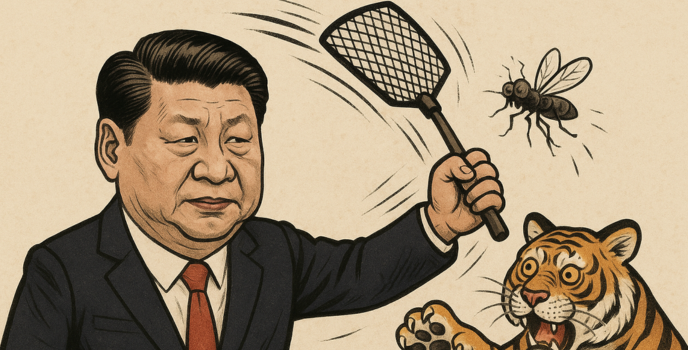All institutions, big or small, public or private, endure corruption, and China is no exception. Under Xi Jinping’s leadership of the Communist Party of China, the anti-corruption campaign has emerged as an inescapable reality of elite party politics. At its heart are the Eight Central Regulations, a formulation best defined as political rules of engagement and moral code of conduct. Armed with these Regulations, China’s discipline inspection agency, the Central Commission for Discipline Inspection (CCDI) has investigated and punished millions of Party, state and non-state officials for disciplinary violations over the last decade.
"Given its extensive impact and enduring presence, corruption is a highly sensitive issue for the Party Centre and its legitimacy in China. Its significance is confirmed by warnings issued by various General Secretaries of the Party, who have framed it as an existential threat to the Party’s survival and China’s stability."
Academics and analysts have argued that Xi's anti-corruption campaign is a plan to purge his rivals and subdue factions. The fall of several high level officials like Bo Xilai, Zhou Youngkang, Xu Caihou, Ling Jihua and others in the early stages of the campaign set the tone for such an assessment. However, the data on investigations and punishments for violations of the Eight Central Regulations indicates that lower-level officials at the county and township levels are more frequently investigated and punished.
- When the campaign began in 2013, grassroot-level officials accounted for almost all investigations. Since 2020, their share of investigations has remained at 92-93%. Violations by ministerial and provincial level cadres have barely constituted 1% of all violations recorded over 11 years of the campaign.
Over the last decade, the anti-corruption campaign has changed the direction, intensity and focus, visible in the kind of violations the Party has chosen to investigate. Based on an assessement of the data on investigations, the Party has preferred to target violations of extravagance that it considers a threat to authority, unified leadership and political stability.
- The violation of giving and receiving gifts is associated with relationship building and is a preferred choice of networking with colleagues, private sector stakeholders and superiors. Gifting is central to power-for-money transactions, formation of cliques, and build-up of patron-client relationships. Given its importance in upward political mobility for officials, they accounted for 49.29% of all violations in 2024, double the number of such violations since 2015.
Given the wide variety of violations captured in this Special Report, the following takeaways offer insights into the evolving landscape of domestic politics in China:
- The anti-corruption campaign is set to expand and intensify its reach by targetting micro-corruption and "people-centric" issues.
- The crackdown on officials at the lowest level suggests that policy implementation, which was characterised by a high degree of experimentation and creativity in deploying solutions, is likely to be restricted as administrators become wary of falling afoul of the anti-corruption campaign.
- Without facilitative exchanges and interactions, like gift-giving, officials may find it harder to secure benefits, contracts and investments for their region.
- While the emphasis on lower-level officials has remained strong in recent years, the focus is likley to shift towards higher-ranked officials as the Party approaches the 21st Party Congress in 2027.
The report is structured across six sections. It begins with a conceptual and historical overview of corruption and anti-corruption in China, followed by an in-depth analysis of the Eight Central Regulations, their ideological underpinnings, and their institutional implementation. The study then explores empirical patterns in investigations and punishments over the past decade before concluding with an assessment of the broader implications and likely future trajectory of the campaign.
To read the full report, click here.



Author
Rahul Karan Reddy
Rahul Karan Reddy is Senior Research Associate at Organisation for Research on China and Asia (ORCA). He works on domestic Chinese politics and trade, producing data-driven research in the form of reports, dashboards and digital media. He is the author of ‘Islands on the Rocks’, a monograph on the Senkaku/Diaoyu island dispute between China and Japan. He is the creator of the India-China Trade dashboard, the Chinese Provincial Development Indicators dashboard and co-lead for the project ‘Episodes of India-China Exchanges: Modern Bridges and Resonant Connections’. He is co-convenor of ORCA’s annual conference, the Global Conference on New Sinology (GCNS) and co-editor of ORCA’s daily newsletter, Conversations in Chinese Media (CiCM). He was previously a Research Analyst at the Chennai Center for China Studies (C3S), working on China’s foreign policy and domestic politics. His work has been published in The Diplomat, 9 Dash Line, East Asia Forum, ISDP & Tokyo Review, among others. He is also the Director of ORCA Consultancy.
Download PDF